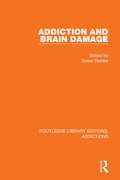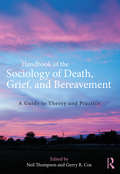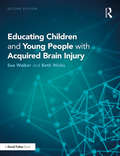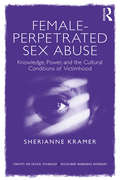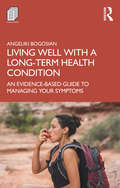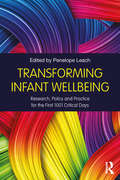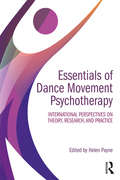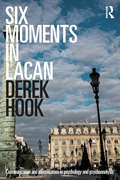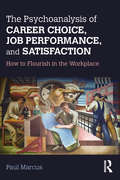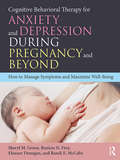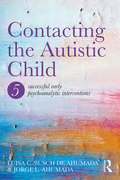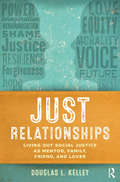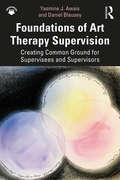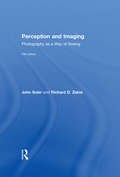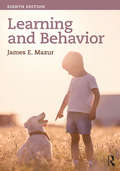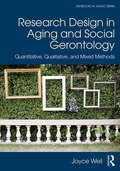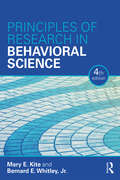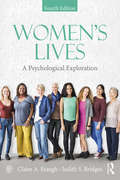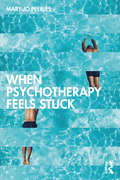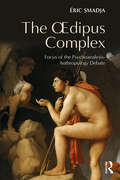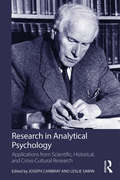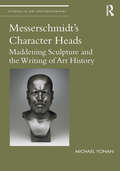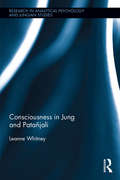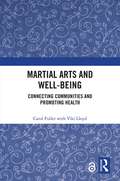- Table View
- List View
Addiction and Brain Damage (Routledge Library Editions: Addictions #3)
by Derek RichterOriginally published in 1980, recent research had produced new insights into how, at the biochemical level, alcohol and other drugs of abuse can impair metabolic and neuropsychiatric functions. Epidemiological studies were also demonstrating that even moderate drinking or drug abuse can produce significant brain damage. This book draws together the latest biochemical, physiological and clinical research on these topics at the time. The initial chapters discuss how alcohol can interfere with various functions: the adaptability of metabolic processes as governed by the ability of the liver to synthesise new enzymes, cell membrane transport, nervous transmission and the transport of nutrients into the brain. It is suggested that opiates, and possibly alcohol, may affect the endorphin system by blocking the uptake of specific amino acids. The second half of the book reports clinical investigations using biochemical studies, psychological tests, EEG investigations and Computerised Axial Tomography (CAT) scanning. It gives the first report of a long-term study by Lishman and co-workers using an improved tomography technique to assess brain damage in alcoholics. These studies give convincing evidence that heavy drinking, even at socially-acceptable levels, can cause serious brain damage in vulnerable people.
Handbook of the Sociology of Death, Grief, and Bereavement: A Guide to Theory and Practice
by Neil Thompson Gerry R. CoxThe Handbook of the Sociology of Death, Grief, and Bereavement sets issues of death and dying in a broad and holistic social context. Its three parts explore classical sociology, developments in sociological thought, and the ways that sociological insights can be useful across a broad spectrum of grief-related topics and concerns. Guidance is given in each chapter to help spur readers to examine other topics in thanatology through a sociological lens. Scholars, students, and professionals will come away from the handbook with a nuanced understanding of the social context –cultural differences, power relations, the role of social processes and institutions, and various other sociological factors – that shape grief experiences.
Educating Children and Young People with Acquired Brain Injury
by Sue Walker Beth WicksEducating Children with Acquired Brain Injury is an authoritative resource book on the effects of brain injury on young people and how educators can understand and support their needs. This new edition has been updated to reflect changes to legislation and practice relating to special educational needs and will enable you to maximise the learning opportunities for young people with acquired brain injury (ABI). Considering key areas in special educational needs such as communication, interaction, cognition, sensory and physical needs, the book provides information on the multifaceted needs of children and young people with ABI and how these needs can be met. This book will help you to: Understand the difficulties that young people with ABI experience Support these students by using appropriate strategies to help their learning Understand and address the social and emotional difficulties experienced by these students Work in partnership with families and other professionals Understand information from other professionals by reference to a glossary of terms Access further useful information from relevant resources and organisations Written for SENCOs, teachers, teaching assistants, educational psychologists and other education professionals across all settings, Educating Children with Acquired Brain Injury is full of useful information and advice for parents and other family members, clinical and behavioural psychologists, therapists and support workers involved with children and young people with ABI.
Female-Perpetrated Sex Abuse: Knowledge, Power, and the Cultural Conditions of Victimhood (Concepts for Critical Psychology)
by Sherianne KramerFemale-Perpetrated Sex Abuse is a groundbreaking study into gender, sexuality and victimhood. It examines the cultural conditions of possibility for FSA victimhood as a means to advance contemporary critical understandings of the role of gender and sexuality as instruments of modern power. As the first direct exploration of FSA victimhood, this book analyses: why victims of FSA remain so underexplored and invisible as objects of human science knowledge; the limited and overly rigid discourses in local and global psychological theory and practice that continues to treat particular subjects as ‘victim worthy’ through paradigms that construct victimhood as gendered; and the possibility of new discourses that could disrupt normative understandings of gender, sexuality, and power in sex abuse, and as constitutive to the beginnings of a counter-knowledge on transgressive sexualities. By tracing the historical and cultural conditions of the emergence of FSA broadly and FSA victimhood specifically, Kramer illustrates how deeply engrained constructions of gender and sexuality both produce and constrain the possibilities for reporting, disclosing and self-identifying victimhood. Female-Perpetrated Sex Abuse is essential reading for academics, researchers and students alike, in the areas of psychology, sociology, gender studies, criminology, counselling and social work.
Living Well with A Long-Term Health Condition: An Evidence-Based Guide to Managing Your Symptoms
by Angeliki BogosianLiving well with a long-term health condition is one of the most challenging experiences one can have. Written based on the most recent research evidence, this straightforward guide to managing both the emotional and physical aspects of chronic illness gives practical suggestions of how those living with a range of conditions can most effectively manage their symptoms whilst still living an active and fulfilling life. Covering a range of topics including self-management of pain, fatigue, stress and lifestyle changes, and adapting to a diagnosis, the book provides an accessible resource that will enable patients and carers to better understand and meet the psychological challenges of long-term condition. By taking a holistic approach, Bogosian empowers the individual to identify their own goals and the pathways to achieve them to reach personal satisfaction, while negotiating the complexities of their condition. This book will be an indispensable guide to those living with a long-term illness, as well as their family members. It will also be of interest to specialist nurses, care consultants, or social workers working with people with a chronic illness.
Transforming Infant Wellbeing: Research, Policy and Practice for the First 1001 Critical Days
by Penelope LeachTransforming Infant Wellbeing brings together science and policy to highlight the critical importance of the first 1001 days of infancy: the period from conception to the second birthday. Introduced and edited by Penelope Leach, who uniquely combines academic knowledge of infant development with the ability to write about it for wide audiences, the book has at its heart 25 original articles by acknowledged experts in different aspects of infant health and development. Brought together, they showcase innovative science and best practices to a wide range of readers: to scientific colleagues in different disciplines; to politicians and policy makers; to local authority commissioners and specialist advisors, statutory and voluntary organisations and parents. This book has a two-fold purpose in science and in social policy. First, to collect new papers by leading scientists in a single volume, which ensures they reach a broad audience. Second, by introducing and commenting on the significance of these new findings, the book highlights both the benefits that accrue to society when it acts accordingly, and the costs, financial and social, of our failure to do so. In the last 50 years, interest in infant development and especially maternal and infant mental health has burgeoned. A large number of issues at the forefront of child development research mirror those of yesterday, but the research brought to bear upon them has transformed. Thanks largely to technological and statistical advances, we now know a great deal that researchers of earlier generations could only surmise. However, increasing knowledge of infancy has not been matched by an increasing impact on parents and professionals, politicians and policy makers. Bringing contemporary studies involving pregnancy, birth, infancy and toddlerhood together, along with the undisputed evidential findings that flow from them, large gaps between what is known and what is done become apparent. By focusing on what can be done to fill those gaps, Transforming Infant Wellbeing renders inescapable the need to rethink current priorities. It represents essential reading for researchers, parents and policy makers of infancy.
Essentials of Dance Movement Psychotherapy: International Perspectives on Theory, Research, and Practice
by Helen PayneEssentials of Dance Movement Psychotherapy contributes to the global interest in embodiment approaches to psychotherapy and to the field of dance movement psychotherapy specifically. It includes recent research, innovative theories and case studies of practice providing an inclusive overview of this ever growing field. As well as original UK contributions, offerings from other nations are incorporated, making it more accessible to the dance movement psychotherapy community of practice worldwide. Helen Payne brings together well-known, experienced global experts along with rising stars from the field to offer the reader a valuable insight into the theory, research and practice of dance movement psychotherapy. The contributions reflect the breadth of developing approaches, covering subjects including: • combining dance movement psychotherapy with music therapy; • trauma and dance movement psychotherapy; • the neuroscience of dance movement psychotherapy; • the use of touch in dance movement psychotherapy; • dance movement psychotherapy and autism; • relational dance movement psychotherapy. Essentials of Dance Movement Psychotherapy will be a treasured source for anyone wishing to learn more about the psychotherapeutic use of creative movement and dance. It will be of great value to students and practitioners in the arts therapies, psychotherapy, counselling and other health and social care professions.
Six Moments in Lacan: Communication and identification in psychology and psychoanalysis
by Derek HookMany first-time readers of Jacques Lacan come to his work via psychology, a discipline that Lacan was notoriously antagonistic toward. Six Moments in Lacan takes up the dual challenge of introducing Lacanian psychoanalysis to an audience interested in psychology, while also stressing the fundamental differences between the two disciplines. Punctuated by lively examples, Six Moments in Lacan demonstrates the distinctive value of Lacanian concepts in approaching afresh topics such as communication, identity, otherness and inter-subjectivity. Avoiding the jargon and wilful obscurity that so often accompanies expositions of Lacan’s psychoanalytic theories, this book puts Lacanian ideas to work in practical and illuminating ways. A handful of concepts, draw from distinct moments in Lacan’s teaching, are contextualized and explained, and applied to the task of exploring the ‘psychological’ and unconscious dimensions of everyday life. Notions such as the ‘big Other’, ‘full’ versus ‘empty’ speech, logical time, ‘imaginary’ and ‘symbolic’ identification, and the idea of ‘the master signifier’ are brought to life via popular cultural references. Revitalizing several Freudian and Lacanian concepts for everyday use, Six Moments in Lacan asks – and answers – a series of compelling questions: Why is it that each instance of speech implies a listener? Why is the notion of subjectivity inadequate when it comes to the ‘trans-subjective’ nature of language? Is it possible to elaborate a ‘non-psychological’ theory of identification? Why is a Lacanian approach to ‘the subject’ so at odds with models proposed by psychology? Six Moments in Lacan provides an accessible and highly engaging introduction to Lacan and Lacanian psychoanalysis, aimed at early practitioners and students in psychoanalysis, psychotherapy and those studying upper undergraduate and postgraduate level psychology.
The Psychoanalysis of Career Choice, Job Performance, and Satisfaction: How to Flourish in the Workplace
by Paul MarcusFreud said that "love and work" are the central therapeutic goals of psychoanalysis; the twin pillars for a sound mind and for living the "good life." While psychoanalysis has masterfully contributed to understanding the experience of love, it has only made a modest contribution to understanding the psychology of work. This book is the first to explore fully the psychoanalysis of work, analysing career choice, job performance and job satisfaction, with an eye toward helping people make wiser choices that bring out the best in themselves, their colleagues and their organization. The book addresses the crucial questions concerning work: how does one choose the right career; what qualities contribute to excellence in performance; how best to implement and cope with organizational change; and what capacity and skills does one need to enjoy every day work? Drawing on psychoanalytic thinking, vocational counseling, organizational psychology and business studies, The Psychoanalysis of Career Choice, Job Performance, and Satisfaction will be invaluable in clinical psychoanalytic work, as well as for mental health professionals, scholars, career counselors and psychologists looking for a deeper understanding of work-based issues.
Cognitive Behavioral Therapy for Anxiety and Depression During Pregnancy and Beyond: How to Manage Symptoms and Maximize Well-Being
by Sheryl M. Green Benicio N. Frey Eleanor Donegan Randi E. McCabeThis book is a hands-on guide for facilitating treatment of anxiety and depression during pregnancy and the postpartum period. Readers will learn about why anxiety and related difficulties can increase during pregnancy and the postpartum period, the critical roles that thoughts and behaviors play in maintaining symptoms, and how to apply practical cognitive and behavioral strategies to reduce distress and increase coping skills. Chapters are integrated with the latest research, and clinicians and individuals alike are presented with customizable cognitive behavioral therapy-based handouts, exercises, and worksheets proven to meet the unique needs of the perinatal population.
Contacting the Autistic Child: Five successful early psychoanalytic interventions
by Jorge L. Ahumada Luisa C. AhumadaAmid long-standing controversy on their causes, which most regard as neurological, and despite their increasing social impact, there has been scant progress in the therapy of the autistic spectrum disorders. Currently fashionable attempts at treatment through behavioural-cognitive focal approaches do not seek resolution, only re-education and rehabilitation. Contacting the Autistic Child explores the clinical process in the early psychoanalytic treatment of autistic children. Organised around five detailed clinical case studies, and drawing on the ideas of major clinicians in child analysis such as Tustin, Winnicott and Alvarez, this book sets out a clear programme for working with and understanding autistic children in a psychoanalytic setting, with a particular focus on issues of clinical technique but also conceptual matters. Working on the notion that autistic disorders come to be – as Winnicott and Tustin saw it – from an early rupture of the affective communication between baby and mother, this book aims at reinstating such communication in the child-analyst interaction. By way of detailed description of what goes on in the analytic link, the authors strive to make the reader share in what goes on in the clinical setting, evincing how, though at times excruciatingly hard on the therapist, resolution is attainable. Once the "primal dialogue" – to use René Spitz’s terms – is reinstated in a stable way in session, it flows by itself into the family ambience. The clinical accounts of this book make the argument that psychoanalysis, carried along Tustin’s technical lines, and subject to the proviso that treatment starts early, preferably in the first three years of life, is the treatment of choice for autistic spectrum disorders. The strong methodological narrative is important and notable in light of the doubts, criticism and uncertainty that have surrounded the psychoanalytic treatment of autism. This novel, highly detailed narrative of five successful early treatments aims to help dispel the pessimism pervading the field and help to redress the lives of many more children. Contacting the Autistic Child will appeal to psychoanalysts and psychoanalytic psychotherapists endeavouring to obtain results in a major area lacking resolutive approaches.
Just Relationships: Living Out Social Justice as Mentor, Family, Friend, and Lover
by Douglas L. KelleyBringing a social justice lens to daily interpersonal relationships, Just Relationships offers a perspective on existing social science theory that demonstrates how our personal relationships should be grounded in fairness and justice. Douglas Kelley utilizes concepts from a variety of academic disciplines and helping professions to examine the barriers encountered in achieving balanced partnerships. This student-friendly book brings the important new perspective of social justice to courses focusing on interpersonal relationships and family relationships, supplementing traditional textbooks. This book presents key relationship theories in each chapter and then applies them from a social justice perspective; uses thought-provoking case studies and guiding questions to enhance student learning; examines a number of different types of interpersonal relationships including family, friends, lovers, and mentor-mentee relationships within a variety of socioeconomic and sociocultural contexts.
Just Relationships: Living Out Social Justice as Mentor, Family, Friend, and Lover
by Douglas L. KelleyBringing a social justice lens to daily interpersonal relationships, Just Relationships offers a perspective on existing social science theory that demonstrates how our personal relationships should be grounded in fairness and justice. Douglas Kelley utilizes concepts from a variety of academic disciplines and helping professions to examine the barriers encountered in achieving balanced partnerships. This student-friendly book brings the important new perspective of social justice to courses focusing on interpersonal relationships and family relationships, supplementing traditional textbooks. This book presents key relationship theories in each chapter and then applies them from a social justice perspective; uses thought-provoking case studies and guiding questions to enhance student learning; examines a number of different types of interpersonal relationships including family, friends, lovers, and mentor-mentee relationships within a variety of socioeconomic and sociocultural contexts.
Foundations of Art Therapy Supervision: Creating Common Ground for Supervisees and Supervisors
by Yasmine J. Awais Daniel BlauseyFoundations of Art Therapy Supervision serves as a reference guide for art therapists who have found themselves in supervisor roles without prior training and supervisees hoping to learn what to expect from the supervision relationship, and illustrates how to receive and provide clinical art therapy supervision. Written by two art therapists with over 35 years of collective supervision experience, this new resource includes a framework for providing effective supervision in the classroom and in the field, case studies and art-based supervisory exercises, and guidance for new professionals seeking certification or licensure. Chapters weave the authors’ supervision experience with a significant literature review, and feature explanations on how professional identities (art therapist, psychotherapist, counselor, supervisor, supervisee, administrator, educator, etc.) and personal identities (gender, race, sexuality, etc.) influence the supervisory and therapeutic relationships. This book will teach supervisees how to make the most of their experience while simultaneously providing a comprehensive reference for practicing supervisors.
Perception and Imaging: Photography as a Way of Seeing
by John Suler Richard D. ZakiaWhen you look at an image, what do you see and feel? What do you want your audience to see and feel when they view your work? For over thirty years, Dr. Richard Zakia helped thousands of photographers hone in on their creative vision through the inspirational, informative text and images included in his classic book, Perception and Imaging. More than a step-by-step photography instruction manual, Perception and Imaging explores the fundamental act of photography – seeing – through a uniquely comprehensive combination of technique, history, visual perception, philosophy and psychology. No matter your level of technical skill, you can learn to think more clearly about what you wish to convey in your images. Fully revised to account for the unique influences and consequences of the digital revolution and online photosharing, John Suler newly addresses digital impermanence, sensory and cognitive overload, and the selfie, and their effects on perception. Additional coverage also includes microexpressions, Rorschach inkblots and subliminal reactions, transference, and synectics.
Learning and Behavior (8th Edition): Eighth Edition
by James E. Mazur<p>This book reviews how people and animals learn and how their behaviors are changed as a result of learning. It describes the most important principles, theories, controversies, and experiments that pertain to learning and behavior that are applicable to diverse species and different learning situations. Both classic studies and recent trends and developments are explored, providing a comprehensive survey of the field. <p>Although the behavioral approach is emphasized, many cognitive theories are covered as well, along with a chapter on comparative cognition. Real-world examples and analogies make the concepts and theories more concrete and relevant to students. In addition, most chapters provide examples of how the principles covered have been applied in behavior modification and therapy. <p>Thoroughly updated, each chapter features many new studies and references that reflect recent developments in the field. Learning objectives, bold-faced key terms, practice quizzes, a chapter summary, review questions, and a glossary are included. <p>The volume is intended for undergraduate or graduate courses in psychology of learning, (human) learning, introduction to learning, learning processes, animal behavior, (principles of) learning and behavior, conditioning and learning, learning and motivation, experimental analysis of behavior, behaviorism, and behavior analysis.</p>
Research Design in Aging and Social Gerontology: Quantitative, Qualitative, and Mixed Methods (Textbooks in Aging)
by Joyce WeilResearch Design in Aging and Social Gerontology provides a review of methodological approaches and data-collection methods commonly used with older adults in real-life settings. It addresses the role of normative age-related sensory, cognitive, and functional changes, as well as the influence of generational cohort (age-period-cohort) upon each design. It discusses the role of older adults as true co-researchers; issues uniquely related to studies of persons residing in community-based, assisted, skilled, and memory-care settings; and ethical concerns related to cognitive status changes. The text concludes with detailed guidelines for improving existing data collection methods for older persons and selecting the best fitting methodologies for use in planning research on aging. Features of Research Design in Aging and Social Gerontology include: Descriptions and evaluations of a wide range of methodological approaches, and methods used to collect data about older persons (quantitative, qualitative, mixed, and emergent methods: photovoice, virtual environments, etc.) Ways to match research questions to selection of method without a preconceived methodological preference or dominance Real-world and applied examples along with cases from the gerontological literature "How to" sections about reading output/software reports and qualitative-analysis screenshots (from ATLAS.ti) and quantitative (SPSS) output and interpretation Pedagogical tools in every chapter such as text boxes, case studies, definitions of key terms, discussion questions, and references for further reading on chapter topics Glossary of key terms, complete sample research report, and an overview of past methodological research design work in gerontology Companion website at www.routledge.com/cw/Weil where instructors will find PowerPoint presentations, additional discussion questions, and a sample syllabus; and students will find flashcards based on glossary terms, a downloadable copy of the sample research report in the text, and links to data sets, related websites, further reading, and select gerontological journals This text is intended for upper-level undergraduates and masters students in aging and gerontology as well as students in human development, applied anthropology, psychology, public health, sociology, and social-work settings. Health care professionals, social workers, and care managers who work with older adults will also find this text a valuable resource.
Principles of Research in Behavioral Science: Fourth Edition
by Mary E. Kite Bernard E. Whitley Jr.This book provides a comprehensive overview of research methods in the behavioral sciences, focusing primarily on the conceptual issues inherent in conducting research. It covers topics that are often omitted from other texts, including measurement issues, correlational research, qualitative research, and integrative literature reviews. The book also includes discussions of diversity issues as they related to behavioral science research. New to this edition are chapter boxes that focus on applied issues related to each chapter topic. Throughout the book, readable examples and informative tables and figures are provided. The authors also take a contemporary approach to topics such as research ethics, replication research, and data collection (including internet research).
Women's Lives: A Psychological Exploration (4th Edition)
by Claire A. Etaugh Judith S. Bridges<p>This cutting-edge and comprehensive fourth edition of Women’s Lives: A Psychological Perspective integrates the most current research and social issues to explore the psychological diversity of girls and women varying in age, ethnicity, social class, nationality, sexual orientation, and ableness. Written in an engaging and accessible manner, its use of vignettes, quotes, and numerous pedagogical tools effectively fosters students’ engagement, active learning, critical thinking, and social activism. <p>New information covered includes: <p> <li>neoliberal feminism, standpoint theory, mujerista psychology (Chapter 1) <li>LGBT individuals and individuals with disabilities in media (Chapter 2) <li>testosterone testing of female athletes, precarious manhood (Chapter 3) <li>raising a gender non-conforming child, impact of social media on body image (Chapter 4) <li>gender differences in narcissism and Big Five personality traits, women video-game designers (Chapter 5) <li>asexuality, transgender individuals, sexual agency, "Viagra for women" controversy (Chapter 6) <li>adoption of frozen embryos controversy (Chapter 7) <li>intensive mothering, integrated motherhood, "living apart together", same-sex marriage (Chapter 8) <li>single-sex schooling controversy (Chapter 9) <li>combat roles opened to U.S. women, managerial derailment (Chapter 10) <li>work-hours dilemmas of low-wage workers (Chapter 11) <li>feminist health care model, health care for transgender individuals, Affordable Care Act (Chapter 12) <li>feminist critique of CDC guidelines on women and drinking (Chapter 13) <li>cyberharassment, gendertrolling, campus sexual assault (Chapter 14) <li>transnational feminism, men and feminism (Chapter 15)</li> <p> <p>Women’s Lives stands apart from other texts on the psychology of women because it embeds within each topical chapter a lifespan approach and robust coverage of the impact of social, cultural, and economic factors in shaping women’s lives around the world. It provides extensive information on women with disabilities, middle-aged and <p>Its up-to-date coverage reflects current scientific and social developments, including over 2,200 new references. This edition also adds several new boxed features for student engagement. In The News boxes present current, often controversial, news items to get students thinking critically about real-life applications of course topics. Get Involved boxes encourage students to actively participate in the research process. What You Can Do boxes give students applied activities to promote a more egalitarian society. Learn About the Research boxes expose students to a variety of research methods and highlight the importance of diversity in research samples by including studies of underrepresented groups.</p>
When Psychotherapy Feels Stuck
by Mary Jo PeeblesEvery therapist feels stuck at some point. Dr. Peebles offers ways of working with patients that clear openings for growth inside those stuck-places. When Psychotherapy Feels Stuck integrates wisdom from multiple theoretical schools. It balances explicit, systematized frameworks for thinking with sensory-based metaphors. Chapters interweave empirical research with clinical vignettes to describe the power of language choices, tolerating not-knowing, risking relationship, and creating meaning. Therapists from all theoretical backgrounds and experience levels will find something unexpected here that sparks hope and a fresh take when feeling stuck.
The Oedipus Complex: Focus of the Psychoanalysis-Anthropology Debate
by Éric SmadjaThis book examines the contentious relationship between psychoanalysis and anthropology as it has played out in disputes surrounding the Oedipus complex. Here, Éric Smadja explores the complicated historical and epistemological conditions leading up to the emergence of the conflict between the two disciplines. He considers the origins of each science, the "creation" of the Oedipus complex, and the place, role and influence of Freud’s key and controversial work Totem and Taboo, both in the history of psychoanalysis and as it connects with anthropology internationally. Focusing on such key figures as Bronislaw Malinowski, Ernest Jones, Franz Boas, Georges Devereux, Emile Durkheim, Claude Levi-Strauss and Jacques Lacan, Smadja charts the course of the debate as it unfolded during the twentieth century and tracks its contemporary status of the debate, with a focus on figures in both France and the United States. Discussing the divergences and convergences between the two fields, he compares and contrasts their historical, epistemological and methodological features and reflects on the new "acculturative" disciplines emerging from their interaction. The book concludes with a look at what the conflictual history of these two human sciences can tell us about the history of ideas and their processes and modes of communication. Exploring a dispute which reaches back to the very beginnings of psychoanalysis and anthropology, The Oedipus Complex will appeal to psychoanalysts in practice and in training, psychotherapists and academics and students of psychoanalytic studies, anthropology and the history of ideas.
Research in Analytical Psychology: Applications from Scientific, Historical, and Cross-Cultural Research
by Joseph Cambray Leslie SawinResearch in Analytical Psychology: Applications from Scientific, Historical, and Cross-Cultural Research is a unique collection of chapters from an international selection of contributors, reflecting the contemporary field of research in Analytical Psychology with a focus on qualitative and mixed-methods research. Presented in seven parts, this volume offers unique qualitative research that highlights approaches to understanding the psyche and investigating its components, and offers a Jungian perspective on cultural forces affecting individual psychology. The book brings forward the connections between Analytical Psychology and other disciplines including neuroscience, psychotherapy research, developmental research, Freudian psychoanalysis, and cultural studies. Part I provides an introduction to the volume, establishes the nature of qualitative and interdisciplinary research and its applications for research in other fields, and outlines the presented work. Part II, Approaching Qualitative Research in Analytical Psychology, examines postmodernism and the value a Jungian perspective offers, and introduces Jung’s correspondence as an emerging resource. Part III, Research on Symbolic Aspects of the Psyche, looks at archetypal theory and cultural complex theory. Part IV, Research on Consciousness and Emotion, presents chapters on meditation and the spectrums of emotion in mythologies, philosophy, Analytical Psychology, and the neurosciences. Part V, A Complex Systems Approach to the Psyche, addresses research on synchronicity, the geometry of individuation, and complexity, ecology, and symbolism. Part VI, Cross-Cultural Research, contains chapters concerning transcendence, psychosocial transformation, psychological infrastructure, and cultural complexes and cultural identity. Part VII concludes the volume by setting directions for potential areas of future study and collaboration. Each chapter provides an overview of research in a specific area and closes with potential directions for future investigation. The book will enable practitioners and researchers to evaluate the empirical status of their concepts and methods and, where possible, set new directions. It also presents the significance of contemporary Analytical Psychology and offers opportunities for cross-discipline collaboration and fertilization. This book will be essential reading for analytical psychologists in practice and in training, academics and students of Analytical Psychology and post-Jungian ideas, and academics and students of other disciplines seeking to integrate methods from Analytical Psychology into their research. It is complemented by its companion volume, Research in Analytical Psychology: Empirical Research.
Messerschmidt's Character Heads: Maddening Sculpture and the Writing of Art History (Studies in Art Historiography)
by Michael YonanThis book examines a famous series of sculptures by the German artist Franz Xaver Messerschmidt (1736–1783) known as his "Character Heads." These are busts of human heads, highly unconventional for their time, representing strange, often inexplicable facial expressions. Scholars have struggled to explain these works of art. Some have said that Messerschmidt was insane, while others suggested that he tried to illustrate some sort of intellectual system. Michael Yonan argues that these sculptures are simultaneously explorations of art’s power and also critiques of the aesthetic limits that would be placed on that power.
Consciousness in Jung and Patañjali (Research in Analytical Psychology and Jungian Studies)
by Leanne WhitneyThe East-West dialogue increasingly seeks to compare and clarify contrasting views on the nature of consciousness. For the Eastern liberatory models, where a nondual view of consciousness is primary, the challenge lies in articulating how consciousness and the manifold contents of consciousness are singular. Western empirical science, on the other hand, must provide a convincing account of how consciousness arises from matter. By placing the theories of Jung and Patañjali in dialogue with one another, Consciousness in Jung and Patañjali illuminates significant differences between dual and nondual psychological theory and teases apart the essential discernments that theoreticians must make between epistemic states and ontic beliefs. Patañjali’s Classical Yoga, one of the six orthodox Hindu philosophies, is a classic of Eastern and world thought. Patañjali teaches that notions of a separate egoic "I" are little more than forms of mistaken identity that we experience in our attempts to take ownership of consciousness. Carl Jung’s depth psychology, which remains deeply influential to psychologists, religious scholars, and artists alike, argues that ego-consciousness developed out of the unconscious over the course of evolution. By exploring the work of key theoreticians from both schools of thought, particularly those whose ideas are derived from an integration of theory and practice, Whitney explores the extent to which the seemingly irremediable split between Jung and Patañjali’s ontological beliefs can in fact be reconciled. This thorough and insightful work will be essential reading for academics, theoreticians, and postgraduate students in the fields of psychology, philosophy of science, and consciousness studies. It will also appeal to those interested in the East–West psychological and philosophical dialogue.
Martial Arts and Well-being: Connecting communities and promoting health
by Carol Fuller Viki LloydMartial Arts and Well-Being explores how martial arts as a source of learning can contribute in important ways to health and well-being, as well as provide other broader social benefits. Using psychological and sociological theory related to behaviour, ritual, perception and reality construction, the book seeks to illustrate, with empirical data, how individuals make sense of and perceive the value of martial arts in their lives. This book draws on data from over 500 people, across all age ranges, and powerfully demonstrates that participating in martial arts can have a profound influence on the construction of behaviour patterns that are directly linked to lifestyle and health. Making individual connections regarding the benefits of practice, improvements to health and well-being – regardless of whether these improvements are ‘true’ in a medical sense – this book offers an important and original window into the importance of beliefs to health and well-being as well as the value of thinking about education as a process of life-long learning. This book will be of great interest to a range of audiences, including researchers, academics and postgraduate students interested in sports and exercise psychology, martial art studies and health and well-being. It should also be of interest to sociologists, social workers and martial arts practitioners.
